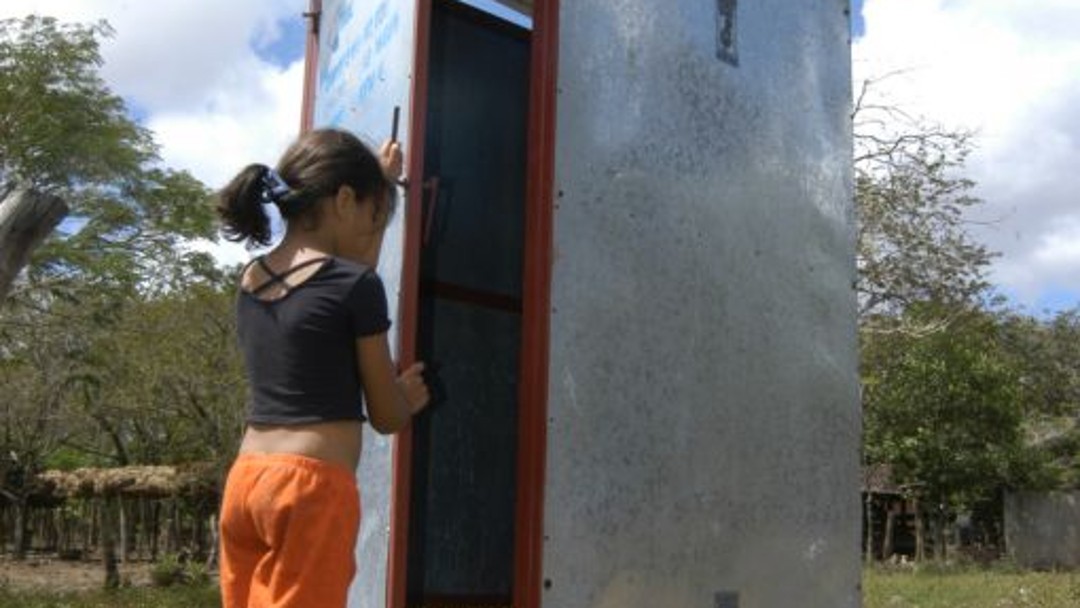News from 2015-11-19 / KfW Development Bank
"Using a toilet is the best form of preventative care"
World Toilet Day: clean sanitary facilities prevent diseases
19 November is World Toilet Day. You’ve never heard of it? Well, that’s hardly surprising. After all, in our day-to-day lives, having our own toilet is just as natural as having air to breathe. But this isn’t the case for one third of the world’s population. Indeed, 2.4 billion people have no access to clean sanitation facilities, and more than a billion people are even forced to answer the call of nature in exposed locations – including open fields, bushes and bodies of water. And doing so is a risky business – one that can even jeopardise the very life and limb of those affected.
Without toilets, there’s no way of stopping faecal matter and urine from entering drinking water. Without toilets, there’s no stopping the inevitable spread of germs and thus often fatal diseases such as diarrhoea, cholera, typhus or worm infections. The World Health Organization (WHO) estimates that 1.5 million people die every year as a result of inadequate sanitation facilities and contaminated drinking water. One person dies every 20 seconds. Diarrhoeal diseases caused by inadequate hygiene kill more children under the age of five than malaria, measles and HIV/AIDS combined. Naturally, building toilets will only solve one part of the problem. Adequate disposal systems and hygiene education are also crucial success factors if health is to be improved in the long term.
Poorer people living in rural regions are particularly affected
"A toilet is the cheapest form of preventative medical care," explains entrepreneur Jack Sim, the founder of the World Toilet Organization (WTO). The WTO inaugurated World Toilet Day in 2001. Its aim in so doing was – and, indeed, still is – to illustrate the fact that while going to the toilet may well be the most natural thing in the world, the shortage of toilets certainly isn’t a trivial problem. In 2013, the General Assembly of the United Nations unanimously declared 19 November to be "World Toilet Day".
Poorer people living in rural regions and slum-dwellers are especially affected by a shortage of toilets. And particularly for the women and girls living in such regions, sanitary facilities being located outside of houses and apartments is a major problem. Just to go to the toilet, they have to leave protected areas and, therefore, put themselves in danger.
Girls need adequate privacy
Girls need adequate privacy – and this also holds true for girls in schools. Particularly at a certain time of the month, they avoid places where they cannot wash – and stay away from schools that don’t have clean toilets. According to a study conducted by the UN, school attendance among girls would increase by 11 % if there were sufficient sanitation facilities around the globe.
Given these major challenges, awareness of the issue is certainly growing. The introduction of the Millennium Goals and the right to sanitation being declared a basic human right should improve the situation somewhat. But the target was not reached. Indeed, achieving further international commitment now forms part of the new Sustainable Development Goals (SDGs).
KfW has been providing support to both sanitary and waste water disposal facilities for a long time now, and is currently involved in more than 380 ongoing projects and programmes. These are often combined with water or waste-related projects. The volume of all these undertakings amounts to more than EUR 5 billion. Within the wide scope of the projects – which includes treatment plants, sewer systems and sewage sludge disposal – financing is being provided so toilets can be built in markets, at bus stations, in schools, in hospitals and in private households. KfW is thereby supporting global efforts to reduce the number of people – which currently stands at 2.4 billion – who do not have access to hygienic sanitation facilities and to, one day, make the toilet a simple fact of life for more people in the world – just as it is for us.


Share page
To share the content of this page with your network, click on one of the icons below.
Note on data protection: When you share content, your personal data is transferred to the selected network.
Data protection
Alternatively, you can also copy the short link: https://www.kfw-entwicklungsbank.de/s/enzBWrMC.BMAB
Copy link Link copied